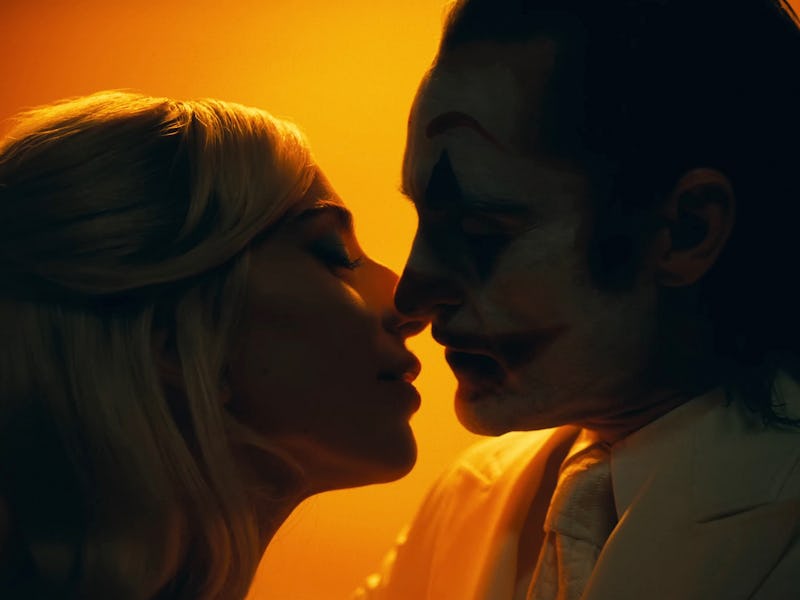Does Joker 2 Understand What Makes Harley Quinn Compelling?
Folie à Deux delivers a more sympathetic take on the Joker — a choice that could come at Harley Quinn’s expense.

In just a few years, Harley Quinn has risen from relative obscurity to become one of DC’s most popular and compelling characters. The 2010s were great for Harley, thanks to a solo comic released in tandem with her first live-action appearance. Margot Robbie brought Joker’s manic partner into the modern age, and her incarnation of Harley — in 2016’s Suicide Squad and its spin-off, Birds of Prey — brought nuance and context to a one-sided relationship. The comics only furthered Harley’s growth, and she’s become one of DC’s biggest successes, outselling tried-and-true properties like Batman and Justice League. Not bad for a character who only recently turned 30.
Harley’s first appearance wasn’t in a comic, but in Batman: The Animated Series. The show introduced Harley and her toxic relationship with the Joker in 1992, and that origin has defined the character. As a psychiatrist at Arkham Asylum, Harley falls for the Joker, warts and all. She’s swept into his life of crime and is typically depicted as Joker’s right-hand lady, but she’s also a victim of his abuse. It’s a suitably dark story for one of DC’s most despicable heroes, and it makes Harley’s eventual independence that much more rewarding.
The Animated Series informed every version of Harley Quinn, from the comics to video games and, eventually, her own adventure. For 32 years, Harley’s story has remained faithful to her roots — but that all changes with Joker: Folie à Deux. The upcoming film will introduce Joaquin Phoenix’s Joker to a reimagined version of Harley Quinn, portrayed by Lady Gaga. Based on its first trailer, this incarnation is already drastically different from more traditional takes. Does straying from Harley’s established origins hurt or help the film?
As Harley Quinn, Lady Gaga is ready to dive into shared madness with the Joker.
Folie à Deux is the first DC property to introduce Harley not as a venerated criminal psychiatrist, but as a patient in Arkham State Hospital. As director Todd Phillips is delivering an alternate-universe take on Gotham City, there’s nothing inherently wrong with fudging a character’s origin. It sets Gaga’s Harley apart from Robbie’s “definitive” film version, and it might better serve the story Phillips wants to tell, as Folie à Deux follows the Joker (aka Arthur Fleck) in the immediate aftermath of his crime spree.
It’s safe to assume these two lovebirds will wreak some havoc while in Arkham, and eventually rejoin society together. But the instinct to put these characters on equal footing, while innovative, could hurt what Harley is meant to represent. Folie à Deux is already glossing over a key part of their relationship. Yes, their love is genuine, and it’ll be interesting to watch them play off each other’s madness. But what about the abuse that Joker inflicts on Harley? It may be too soon to weigh in on those themes, but there’s a sense the power dynamics could shift in Harley’s favor... and that might not be a good thing.
In the trailer, it’s Harley who seems more volatile. She’s seen holding Arthur at gunpoint, and she smears the blood of a victim over her mouth for some DIY clown makeup. Whether that altercation really happens or is just a delusion is still a mystery, but there’s already something off about this depiction of Joker and Harley. It might be nice to see the latter take on more agency — and perhaps even call the shots for once — but a more aggressive Harley could paint the Joker as the victim in their toxic relationship.
Harley seems to be taking a more active role in Folie à Deux. How will that affect her origin?
Phillips’ take on the Joker is decidedly more sympathetic than most iterations of the character. He’s a victim of circumstance and madness, rather than an abuser who happens to struggle with mental illness. Folie à Deux will likely position him in an even more sympathetic light — but what does that mean for his partner in crime? Will their roles be reversed, with Harley becoming the one who keeps a reluctant Arthur tethered to a life of chaos?
Joker doesn’t have to be an abuser, especially since we’ve witnessed his cruelty in so many other DC projects. That said, he is meant to be a villain, and his treatment of Harley drives that point home. Without it, what will his role be in this story?
Harley, on the other hand, is more than just the Joker’s victim; it’s her quest to reclaim her autonomy in the face of Joker’s crazed cruelty that makes her a compelling character. There are other ways to establish her strength, and maybe Folie à Deux will show them. A new perspective on a famous story could certainly be interesting. But Phillips will have to do better than empty role reversal between abuser and victim. That’s more shock value than storytelling, and it won’t get to the heart of why Harley has won legions of fans.